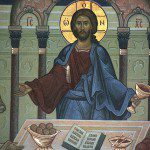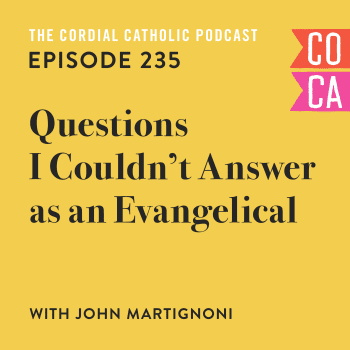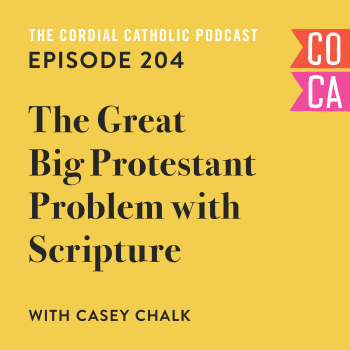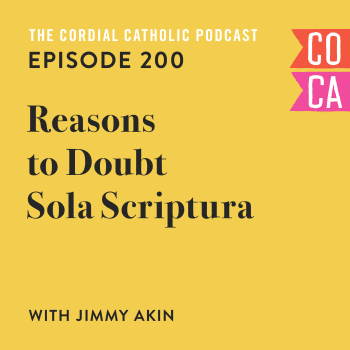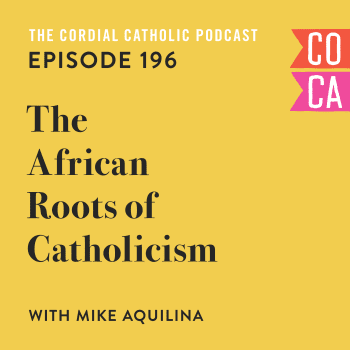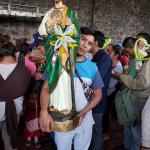
I have very good, charitable, and patient friends. I learned this, again, this week past week.
It was a funny week; an ironic week. On Tuesday, in my RCIA class we practiced for the Rite of Welcoming, the first step for someone joining the Catholic Church. That Rite took place tonight at the Saturday evening Mass. It was surreal. On Wednesday, I went to a Community Conversation in the Protestant church my wife and I attend. It was about the authority of Scripture and how we understand and interact with the Bible. Ironic given what I’ve been writing about recently. And Thursday, was a talk at a local parish on Scripture and Tradition.
All in all it was ironic, and strangely poetic and it communicated two things very clearly to me.
First, I am no longer a Protestant, not really, if what chiefly distinguishes a Protestant from a Catholic is the belief in a God-given authority beyond the Bible.
And second, I have very good, patient, and kind friends.
This journey has been strange with dramatic ups and downs. It’s been, at times, a complete slog. At other times it’s been break-neck. At times the yoke has been easy and the pieces have fallen together effortlessly. At other times it’s felt like beating my fists against a brick wall. Simple lessons, good friends, and poignant ironies this week have made the trip all the more blessed.
In the midst of taking my first step towards the Catholic Church, of listening in on a discussion about the authority of Scripture, and then listening to a lecture from the other perspective I was reminded, through a podcast of all things, of a simple and beautiful apologetic answer to scripture alone.
I wrote earlier of my struggles with the Protestant notion of sola scriptura, the authority of the Scriptures alone, in and of themselves. I struggled with understanding this and my struggles, in large part, led me to where I am today. I wrote previously that I didn’t understand how a good God would leave us a book to do our best with. I wrote that I didn’t think that was consistent with His character. He prayed for Christian unity after all.
But there’s a more simple way to look at it, or, at least, a different, compelling perspective and after hearing the stories of some of my friends, their difficulties with interpreting Scripture I want to, again, offer another solution. If I may.
Patrick Madrid, a Catholic apologist and serious moustache supporter, tells a story of meeting with two devout Calvinists after a talk he gave one night. They met at a Denny’s and with Bibles spread out on the table began to debate the finer points of Catholic and Protestant doctrine. Madrid recalls being frustrated because of every Bible verse he had to support his point of view, his Calvinist colleagues would respond, “But you’re interpreting that wrong.”
Frustrated, Madrid wrote the following phrase on a napkin,
I never said you stole the money.
He slid the napkin across the table and said, “Here, what did I mean when I wrote this?”
Immediately, a plain sense interpretation of Madrid’s sentence becomes impossible. The illustration was pretty profound.
Did he mean, I never said you stole the money. Or, I never said you stole the money. Or maybe, I never said you stole the money?
The interpretations abound and these don’t even take into account contextual factors of time, place, and authorship.
If interpreting a phrase on a napkin is so difficult, says Madrid, how much more are the Scriptures which deal with the fundamentals of our faith, the record of Jesus, our God, talking to us. And the myriad of authors and genres. Interpretation is not easy.
Patrick Madrid’s apologetic example resonates with me.
It’s been a strange and ironic week. I’ve been buoyed by the excitement of beginning my entrance into the Catholic Church; of deep and meaningful conversations with friends. But I’ve been heartsick, too, by the stories of those wrestling, difficulty, through Scripture. I’ve said before that stumbling into Catholicism has often felt like discovering a hidden treasure. Finding out that God, in my opinion and understanding, has left us a Church to help point the way has been one of those treasures. A Church that has the God-given authority to interpret and teach—the power to bind and loose.
Madrid makes clear, with his demonstration, that interpreting Scripture alone or even in a community is fraught with difficulty. Certainly Protestant scholarship has come up with frameworks, over time, to interpret the Bible but they cannot agree and they are products of their time. Even N.T. Wright, who I respect and admire for his immense body of work, suggests a new and novel way of interpreting Scripture. Still, there is disagreement on the very fundamentals of the faith like how one is saved.
The Catholic Church has wrestled, and continues to wrestle, with these things too but within a framework of a Church that believes itself to be endowed, by God, with the power to figure it out. In a reality where someone can write a simple note on a napkin and spawn a myriad of possible meanings this is what makes sense to me.
In a week of ironies and happenstance this is what I know. That the problem of plain sense, for me, is solved by the plain sense of the existence Church. That God gave us the interpreter. That this is the most logical explanation. That I can’t make sense of that sentence on the napkin without guidance from it’s creator.

